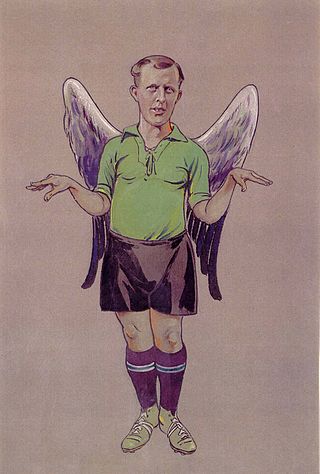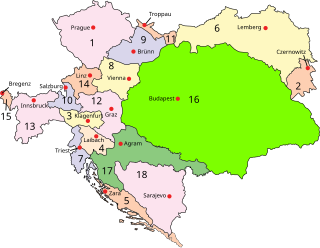
Austria-Hungary, often referred to as the Austro-Hungarian Empire or the Dual Monarchy, was a multi-national constitutional monarchy in Central Europe between 1867 and 1918. Austria-Hungary was a military and diplomatic alliance of two sovereign states with a single monarch who was titled both emperor of Austria and King of Hungary. Austria-Hungary constituted the last phase in the constitutional evolution of the Habsburg monarchy: it was formed with the Austro-Hungarian Compromise of 1867 in the aftermath of the Austro-Prussian War and was dissolved shortly after Hungary terminated the union with Austria on 31 October 1918.

The Mitropa Cup, officially called the La Coupe de l'Europe Centrale or Central European Cup, was one of the first international major European football cups for club sides. It was conducted among the successor states of the former Austria-Hungary. After World War II in 1951 a replacement tournament named Zentropa Cup was held, but just for one season, the Mitropa Cup name was revived, and again in 1958 the name of the tournament changed to Danube Cup but only for one season. The tournament was discontinued after 1992.

Fußballklub Austria Wien AG (German pronunciation:[ˈaʊstri̯aːˈviːn]; known in English as Austria Vienna, and usually shortened to Austria in German-speaking countries, is an Austrian professional association football club from the capital city of Vienna. It has won the most trophies of any Austrian club from the top flight, with 24 Austrian Bundesliga titles and 27 cup titles, although its rival SK Rapid Wien holds the record for most national championships with 32. Alongside Rapid, Austria is one of only two teams that have never been relegated from the Austrian top flight. With 27 victories in the Austrian Cup and six in the Austrian Supercup, Austria Wien is also the most successful club in each of those tournaments. The club reached the UEFA Cup Winners' Cup final in 1978, and the semi-finals of the European Cup the season after. The club plays at the Franz Horr Stadium, known as the Generali Arena since a 2010 naming rights deal with an Italian insurance company.

First Vienna FC is an Austrian association football club based in the Döbling district of Vienna. Established on 22 August 1894, it is the country's oldest team and has played a notable role in the history of the game there. It is familiarly known to Austrians by the English name Vienna.

The Austro-Hungarian Army or Imperial and Royal Army was the land force of the Austro-Hungarian Dual Monarchy from 1867 to 1918. It was composed of three parts: the joint army, the Imperial Austrian Landwehr, and the Royal Hungarian Honvéd.

Fudbalski klub Slavija Sarajevo is a professional association football club from the city of Istočno Sarajevo, Republika Srpska that is situated in Bosnia and Herzegovina. Slavija Sarajevo is a member of the Football Association of Republika Srpska and the Football Association of Bosnia and Herzegovina and it is active in the First League of the Republika Srpska. The club's home stadium is Gradski SRC Slavija Stadium, which has a capacity of 6,000 seats.
The European International Cup of Nations was an international football competition held by certain national teams from Central Europe & South Europe between 1927 and 1960. There were competitions for professional and amateur teams. Participating nations were: Italy, Austria, Czechoslovakia, Hungary, Switzerland, Poland, Romania, and Yugoslavia. Poland and Romania only competed in the amateur competition.

Matthias Sindelar was an Austrian professional footballer. Regarded as one of the greatest Austrian players of all time, Sindelar notably played for Austria Vienna and the national side.

HŠK Građanski, also known as 1. HŠK Građanski or fully Prvi hrvatski građanski športski klub, was a Croatian football club established in Zagreb in 1911 and dissolved in 1945. The club had a huge influence on the development of football in Croatia and Kingdom of Yugoslavia and achieved its greatest success in the period between the two World Wars.

Hugo Meisl, brother of the journalist Willy Meisl, was the multi-lingual football coach of the famous Austrian 'Wunderteam' of the early 1930s, as well as a referee.

Heinrich "Wudi" Müller was an Austrian football player and coach. In the early 1930s he was an albeit minor part of Austria's all conquering Wunderteam. As coach he defined the post-World War II glory period of Austria Wien.
Wiener Athletiksport Club, also known as Wiener AC or WAC, is an Austrian sports club in Vienna. It is particularly noted for its hockey team, which was established in 1900.
The 1933 season of the Mitropa Cup football club tournament was won by Austria Wien who defeated AS Ambrosiana Inter 4–3 on aggregate in the final. It was the third time that a team from Vienna won the tournament, but the first of two wins for FK Austria Wien. The two legs were played on 3 September in San Siro stadium and 8 September in Prater Stadium.

The Imperial and Royal Foreign Ministry was the ministry responsible for the foreign relations of the Austro-Hungarian Empire from the formation of the Dual Monarchy in 1867 until it was dissolved in 1918.
AVV RAP, in the long form Amsterdamsche Voetbalvereeniging RUN, Amstels, Progress, was a Dutch football club based in Amsterdam, playing in the Netherlands Football League Championship. The club existed from 1887 to 1914 and was the first cup champion of the Netherlands in the 1898–99 season. The club is most famous for being the winners of the first edition of the Coupe Van der Straeten Ponthoz in 1900, one of the world's first international footballing competitions, in which they played and defeated the reigning champions of Belgium, Switzerland and the Netherlands on three successive days.

Ferdinand Wesely was an Austrian footballer and coach. He was son of the shoemaker Jakob Wesely and Antonie. As a first class seaman, he was assigned to the battleship SMS Zrínyi in August 1914 and served on various ships in the Navy throughout the First World War. As of 1929 he was married to the merchant's daughter Martha née Hörmann.

The dissolution of Austria-Hungary was a major geopolitical event that occurred as a result of the growth of internal social contradictions and the separation of different parts of Austria-Hungary. The more immediate reasons for the collapse of the state were World War I, the 1918 crop failure, general starvation and the economic crisis. The Austro-Hungarian Empire had additionally been weakened over time by a widening gap between Hungarian and Austrian interests. Furthermore, a history of chronic overcommitment rooted in the 1815 Congress of Vienna in which Metternich pledged Austria to fulfill a role that necessitated unwavering Austrian strength and resulted in overextension. Upon this weakened foundation, additional stressors during World War I catalyzed the collapse of the empire. The 1917 October Revolution and the Wilsonian peace pronouncements from January 1918 onward encouraged socialism on the one hand, and nationalism on the other, or alternatively a combination of both tendencies, among all peoples of the Habsburg monarchy.
The Coupe Van der Straeten Ponthoz, also known as Coupe Ponthoz, was an international competition for football clubs from Europe that ran from 1900 to 1909. It was one of the first European club football tournaments and is considered a predecessor of club tournaments in Europe, namely the European Cup. It was named in honor of the donator of the trophy Carl van der Straten-Ponthoz
The 1900 Coupe Van der Straeten Ponthoz was the 1st staging of the Coupe Van der Straeten Ponthoz, which is regarded as one of the first European trophies. The tournament was held in Brussels, between 15 and 17 April 1900.

The Austro-Hungarian Bank was the central bank of the Habsburg Monarchy in the 19th and early 20th centuries.












